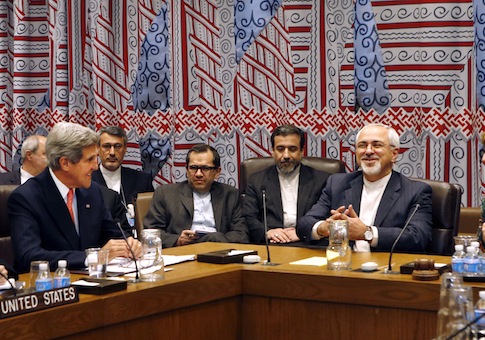Activists say concerns over human rights abuses in Iran, such as the imprisonment of U.S. pastor Saeed Abedini, appear to be taking a backseat to ongoing negotiations over the country’s nuclear program.
Abedini, an American pastor who was sentenced to eight years in prison last year because of his Christian faith, was recently moved to a more dangerous facility outside of Tehran. Experts have also noted an increase in state executions and persecution of religious minorities under the tenure of new President Hassan Rouhani despite his putative reputation as a moderate.
As world powers plan to resume talks with Iran in 10 days that could potentially lift crippling sanctions on the country in return for partial restraints on its nuclear program, activists say human rights concerns have fallen from view.
"Human rights are not on the agenda, have not been in a meaningful way, and are far less likely to be with a nuclear deal potentially in sight," said Charles Dunne, director of Middle East and North Africa programs at Freedom House, in an email. "I do not expect them to re-emerge after any deal, as the U.S. will more than likely focus on broader improvements in the relationship, which human rights concerns would only trouble."
Human rights conditions in Iran garnered scrutiny again earlier this month with Abedini’s transfer to the Rajai Shahr Prison. He has been placed in a 10ft x 10ft prison cell near Iran’s most violent criminals, including murderers and rapists. Observers say the Iranian regime sends those it views as troublemakers to the prison to "disappear."
Twenty-three U.S. senators sent a bipartisan letter to President Barack Obama last week calling on the "United States government to speak out boldly on behalf of Pastor Saeed, at the earliest possible opportunity." An online petition advocating for his release has collected more than 200,000 signatures.
"As diplomatic talks continue today between Iran and world leaders, Pastor Saeed’s name must be a part of these talks," wrote Jordan Sekulow, executive director of the American Center for Law and Justice, in a post Thursday.
After Rouhani was asked about Abedini and other Americans imprisoned in Iran at the U.N. General Assembly in September, he told CNN that "we also have people who are in prison here in the United States" and that "the government has no right to interfere in the judicial process."
Obama reportedly pressed Rouhani on Abedini and other prisoners in a phone call days later.
However, U.S. officials have publicly kept mum on human rights during the most recent nuclear negotiations.
Michael Ledeen, freedom scholar at the Foundation for Defense of Democracies and an Iran expert, said in an interview that the United States has talked with Iran behind the scenes about issues like prisoners for more than 30 years, contrary to the widely held belief that the United States and Iran broke off diplomatic relations in 1979. Islamic revolutionaries seized control of the Iranian government and the U.S. embassy that year.
Iran uses prisoners to undermine U.S. interests, he said.
"It’s not linked to any particular negotiation," he said. "It’s just chips in their pocket to lay down when they think they’ve got a good hand, and when they need to get out of a jam they can let out the hostages."
Ledeen also questioned "the myth of Rouhani the reformer."
"Rouhani if anything is worse than [former Iranian President Mahmoud] Ahmadinejad," he said. "The execution rate is up. The crackdown on dissidents is up. He’s been shutting down newspapers recently."
"He’s been talking about releasing political prisoners," Ledeen added. "There were some released, but they’re back in jail now."
The Iranian regime announced the release of 80 political prisoners just after Rouhani left to attend the U.N. General Assembly in September, including prominent human rights lawyer Nasrin Sotoudeh.
Still, Freedom House estimates that about 800 Iranian political prisoners remain behind bars. Iran has also executed more than 500 people this year, some petty criminals and others minorities convicted at sham trials, according to Amnesty International.
The president’s National Security Council and the U.S. State Department did not immediately return requests for comment.
